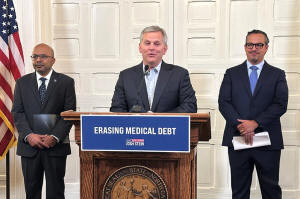North Carolina effort wipes out $6.5B in medical debt for 2.5M people
[October 14, 2025]
By GARY D. ROBERTSON
RALEIGH, N.C. (AP) — More than 2.5 million North Carolina residents are
getting over $6.5 billion in medical debt eliminated through a state
government effort that offered hospitals extra Medicaid funds from
Washington if they gave low- and middle-income patients the financial
relief and implemented policies to discourage future liabilities.
Democratic Gov. Josh Stein, the state health department secretary and
other officials announced Monday results so far from what then-Gov. Roy
Cooper unveiled 15 months ago as a first-of-its-kind initiative.
While helping almost one-quarter of North Carolina residents, Stein said
the effort has exceeded expectations in giving individuals and families
a second chance to succeed financially after medical crises. Officials
previously estimated it could help about 2 million people get rid of $4
billion in debt. The debt that had been held by hospitals, and are
usually difficult to recover, will be pulled from credit reports, the
governor said.
“This is life-changing news for so many families,” Stein said, adding
that recipients on average will have $2,600 erased. “No one chooses to
have a heart attack or get diagnosed with a chronic condition — you just
have to deal with it. Today’s announcement will free people from the
financial stress so that they can focus on getting healthy.” Another
news conference speaker described patients who avoided services or
threatened to halt treatments to prevent more debt from accumulating on
themselves or their family.
Hospitals that agreed to participate have already alerted many patients
to tell them their debt is essentially canceled, state health officials
said Monday. And Undue Medical Debt, a national group working on the
effort and taking over some hospital liabilities, plans to send 255,000
notices this week to other recipients.

The effort germinated from what's called the Healthcare Access and
Stabilization Program, which state legislators approved in 2023 at the
same time as expanded Medicaid coverage to working adults who couldn’t
otherwise qualify for conventional Medicaid. Hospitals pay assessments
to draw down billions of dollars in federal money.
The state Department of Health and Human Services last year proposed
that certain hospitals could receive higher program reimbursement levels
to treat Medicaid enrollees if they agreed to medical debt initiatives.
The federal Centers for Medicare and Medicaid Services signed off on the
plan details, and by August 2024 each of the roughly 100 acute-care,
rural or university-connected hospitals that qualified decided to
participate.
[to top of second column]
|

North Carolina Gov. Josh Stein, center, flanked by Health and Human
Services Secretary Dr. Dev Sangvai, left, and Undue Medical Debt
Vice Chair Jose Penabad, speaks about the elimination of medical
debt through an initiative involving hospitals and Medicaid at the
Executive Mansion in Raleigh, N.C., Monday, Oct. 13, 2025. (AP
Photo/Gary D. Robertson)
 Under rules previously announced,
the hospitals had to eliminate medical debt going back to early 2014
for patients who are Medicaid enrollees. They also would later have
to eliminate other debt for non-enrollees based on income levels.
And the hospitals were directed to discourage debt by doing things
like automatically enrolling people in charity care programs or
curbing certain debt collection practices. The $6.5 billion figure
includes debt relieved directly through the initiative and through
hospital policy changes to implement it, Stein's office said.
Other state and local governments have tapped into federal American
Rescue Plan funds to help purchase and cancel residents’ debt.
Arizona Gov. Katie Hobbs announced in July that $429 million in
medical debt had been erased for more than 352,000 state residents.
“North Carolina’s approach is completely unique," said Jose Penabad,
the Undue Medical Debt vice chair. Several states are following
North Carolina’s use of Medicaid incentives closely, he added.
North Carolina debt eradication exceeded initial estimates in part
because patients outside the population being targeted also had
their debt eliminated, Stein said. Hospitals, for example, sometimes
have eliminated debt for patients incurred at associated physician
practices, said Jonathan Kappler, a state deputy health secretary.
More debt will be eliminated in the future, he added.
State health secretary Dr. Dev Sangvai, told reporters the law
approved by Congress in July that made cuts and policy changes to
Medicaid won’t immediately affect the debt elimination initiative.
Some hospitals were initially hesitant about the debt relief
initiative because new requirements were being placed upon the
reimbursements, Cooper said last year. The North Carolina Healthcare
Association, which lobbies for nonprofit and for-profit hospitals,
said Monday in a statement that it’s concerned “recent and proposed
government policies could add financial pressures” that prevent
hospitals from expanding programs to help low-income patients.
All contents © copyright 2025 Associated Press. All rights reserved |